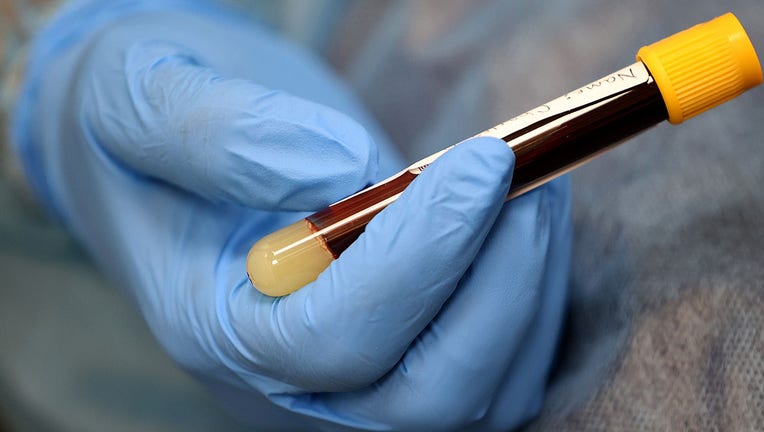Mounting evidence ties blood type to COVID-19 risk, O may help, A may hurt

Residents have their blood drawn for an antibody test for the coronavirus, also called a serology test, June 16, 2020 in Washington, DC (Win McNamee/Getty Images)
LOS ANGELES - Growing evidence suggests that blood type may influence whether someone becomes infected with the novel coronavirus or develops severe complications from the illness.
In two new studies, published last week in the journal Blood Advances, scientists found key differences between blood type. Those with type A blood were more likely to have severe disease, while those with type O were less likely.
In the first study, researchers in Denmark looked at data on 473,654 people, who tested for COVID-19 from February to July. 7,422 tests came back positive.
Of those positive tests, blood group O was associated with a decreased risk for contracting SARS-CoV-2 infection.
“Here, we demonstrate that blood group O is significantly associated with reduced susceptibility to SARS-CoV-2 infection,” the study authors wrote.
The study’s findings were limited, as blood group information was only available for 62% of all tested individuals.
RELATED: Study ties blood type to COVID-19 risk: O may help, A may hurt
In the second, smaller study, data was collected from consecutively admitted ICU patients in six metropolitan Vancouver hospitals between February and April.
Of a total of 125 critically ill COVID-19 patients admitted, 95 had blood group data available and were part of the analyses.
The research found that COVID-19 patients with blood group A or AB were at increased risk for requiring mechanical ventilation compared to those with blood group O or B.
In addition, COVID-19 patients with blood group A or AB appeared to exhibit a greater disease severity than patients with blood group O or B.
“We demonstrate that critically ill COVID-19 patients with blood group A or AB are associated with an increased risk for requiring mechanical ventilation, CRRT, and prolonged ICU length of stay compared with patients with blood groups O or B,” the study’s authors wrote.
RELATED: Rural Midwest hospitals struggling to handle COVID-19 surge
This research backs up another study published back in June in the New England Journal of Medicine, where scientists compared the genes of thousands of patients in Europe and found that individuals with Type A blood were more likely to have COVID-19 complications than those with Type O.
The study, involving scientists in Italy, Spain, Denmark, Germany and other countries, compared about 2,000 patients with severe COVID-19 to several thousand other people who were healthy or who had only mild or no symptoms.
Researchers tied variations in six genes to the likelihood of severe disease, including some that could have a role in how vulnerable people are to the virus. They also tied blood groups to possible risk.
The genetic analysis of COVID-19 patients suggested that blood type might influence whether someone develops severe disease.
Many researchers have been hunting for clues as to why some people infected with the coronavirus get very ill and others, less so. Being older or male seems to increase risk, and scientists have been looking at genes as another possible "host factor" that influences disease severity.
RELATED: Even with COVID-19 coverage safety net, recovered patients hit with hefty hospital bills
There are four main blood types — A, B, AB and O — and "it's determined by proteins on the surface of your red blood cells," said Dr. Mary Horowitz, scientific chief at the Center for International Blood and Marrow Transplant Research.
People with Type O are better able to recognize certain proteins as foreign, and that may extend to proteins on virus surfaces, Dr. Parameswaran Hari, a blood specialist at the Medical College of Wisconsin explained.
During the SARS outbreak, which was caused by a genetic cousin of the coronavirus causing the current pandemic, "it was noted that people with O blood type were less likely to get severe disease," he said.
Blood type also has been tied to susceptibility to some other infectious diseases, including cholera, recurrent urinary tract infections from E. coli, and a bug called H. pylori that can cause ulcers and stomach cancer, said Dr. David Valle, director of the Institute of Genetic Medicine at Johns Hopkins University.
These studies only suggest an association between blood type and the COVID-19 outcome, but does not necessarily correlate to a cause and effect.


